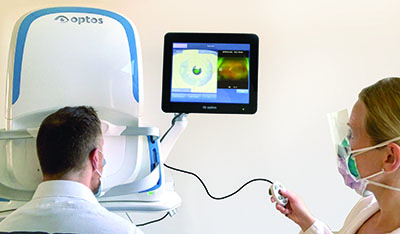Just like any other part of the body, your eyes age as you get older. In honor of Healthy Aging Month, we want to bring to light some helpful tips to keep your eyes healthy as you age. Despite age-related changes to vision, ocular health is often overlooked. Aging is a process that brings many changes. Vision loss and blindness, however, do not have to be one of them. There are several simple steps you can take to keep your eyes healthy for the rest of your life.[1]
Healthy habits like eating well and being active can lower your risk for diseases and conditions that can lead to eye or vision problems.
Eat healthy foods. Be sure to have plenty of dark, leafy greens like spinach, kale, and collard greens. Nuts, legumes seeds and citrus fruits do wonders to fight age-related eye damage. Eating fish that are high in omega-3 fatty acids — like salmon, tuna, and halibut — is good for your eyes, too.
Get active. Being physically active helps you stay healthy. It can also lower your risk of health conditions that can cause eye health or vision problems — like diabetes, high blood pressure, and high cholesterol.
Quit smoking. Smoking is not only bad for your lungs — it can hurt your eyes, too! Smoking increases your risk of diseases like macular degeneration and cataracts — and it can harm the optic nerve.
Protecting your eyes can also play a huge role in keeping eyes healthy.
Wear sunglasses. Protect your eyes from the sun by wearing sunglasses — even on cloudy days! Be sure to look for sunglasses that block 99 to 100 percent of both UVA and UVB radiation.
Wear protective eyewear. Safety glasses and goggles are designed to protect your eyes during certain activities, like playing sports, doing construction work, or doing home repairs. You can buy them from most eye care providers and some sporting goods stores. Get tips to protect your kids' eyes when they play sports
Give your eyes a rest. Looking at a computer for a long time can tire out your eyes. Rest your eyes by taking a break every 20 minutes to look at something about 20 feet away for 20 seconds.
The most important step you can take to protect your vision is routine, comprehensive eye exams. Studies[2] have demonstrated how optomap ultra-widefield (UWF™) retinal imaging is fulfilling a need in supporting the detection and management of both ocular and systemic diseases associated with aging. UWF imaging provides a high resolution, single-capture image of 82% (or 200 degrees) of the retina. Additionally, optomap can enhance the ability to detect, diagnose, and manage diseases in comparison to fundus photography and be captured more efficiently. UWF is being increasingly used in optometric and ophthalmic settings and enables eye care professionals to detect, diagnose, document, and treat ocular pathology including retinal disease that may first present in the periphery.

As we age and approach those golden years, we are at a higher risk for eye diseases including age-related macular degeneration, cataracts, diabetic retinopathy, glaucoma, as well as eye conditions such as dry eye and low vision. More than 40 million Americans are currently 65 years or older, this number is expected to grow to more than 88 million by 2050 and not coincidentally, the number of Americans with age-related eye diseases is expected to double. Early detection and treatment are key to saving sight.[3]
Talk to your eye care professional about including optomap as part of your next eye exam – optomap helps doctors to discover and document the retina with little or no face-to-face interaction and takes only seconds to get a highly-detailed view of the retina, which is critical for detection and management of both ocular and systemic diseases at any age.
[1] https://www.eyeandhealth.com/blog/september-is-healthy-aging-month
[2] https://www.aoa.org/patients-and-public/eye-and-vision-problems/glossary-of-eye-and-vision-conditions/macular-degeneration